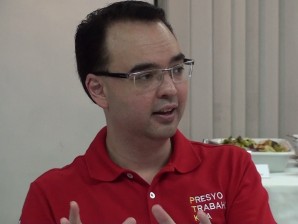Trickle-down effect takes time, says Cayetano of economy
MANILA, Philippines—Sen. Alan Peter Cayetano on Saturday called on Filipinos to stop downplaying the economic gains made by the Aquino administration in the wake of reports that the country’s poverty incidence had remained practically unchanged as shown by the National Statistical Coordination Board’s latest figures.
“The economic growth we now have is an economic milestone,” Cayetano said in a statement.
“While we continue to have great expectations, let us look at this more as an opportunity to work hand in hand with the government to ensure that the trickle-down effect is felt sooner than later,” the reelectionist senator said.
Cayetano, who is running with the administration coalition Team PNoy, said that even leading international economists prescribe a seven- to 10-year period of continuous growth before improvements in quality of life and standards of living could be felt by the poor.
Time for growth
Article continues after this advertisement“The President has only been in office three years. It’s not fair to expect a trickle-down effect overnight. It will take time for GDP growth to result in an improvement of the quality of life index,” he said.
Article continues after this advertisementCayetano cited the experience of China, which recorded sustained growth for over 10 years but has continued to experience extreme poverty.
Cayetano reiterated his proposal for a second-tier Conditional Cash Transfer (CCT) program for small and medium enterprises and local industries.
“I believe the growth of small businesses and the development of local industries are key to stimulating the economy further and a direct effort at increasing jobs and achieving greater income for all Filipino families,” he said.
Cayetano said he believed President Aquino was determined to make the 6.6-percent economic growth felt by the poor.
Reacting to the NSCB report, Social Welfare Secretary Dinky Soliman said the Department of Social Welfare and Development (DSWD) would take it as a challenge to improve its contribution to the national antipoverty program of the Aquino administration.
The NSCB had said that the poverty incidence was estimated at 27.9 percent during the first semester of 2012, compared to 28.8 percent in 2006 and 28.6 percent in 2009.
3.8M households served
“We would like to assure that the DSWD is doing its best to implement programs and projects that will contribute to the poverty alleviation efforts of the government,” Soliman said.
She said the CCT program or Pantawid Pamilyang Pilipino Program being implemented by the DSWD had served 3,841,992 poor households as of April 3. It is being implemented in 1,627 cities and municipalities in 79 provinces in 17 regions nationwide.
Soliman said the CCT was a long-term program and was not expected to improve the poverty situation immediately.
“It will benefit the next generation by breaking the inter-generational cycle of poverty. If children are educated and healthy then productivity may be achieved and productivity means income,” she said.
Based on the program’s evaluation by the World Bank, Pantawid Pamilya is on track to achieve its objectives of promoting intervention in the health and education of children while providing immediate financial support to poor families.
Pantawid Pamilya is one of the three core poverty reduction programs of the DSWD. The other two are the Sustainable Livelihood Program and the Kapit-Bisig Laban sa Kahirapan–Comprehensive and Integrated Delivery of Social Services (Kalahi-CIDSS), a community-driven development program.
